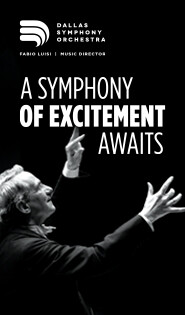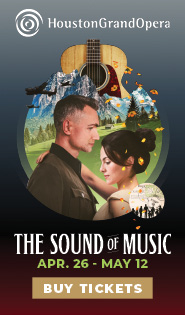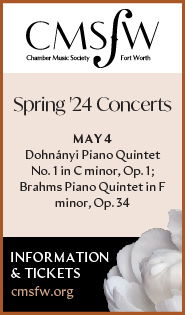The strings shimmer in Fort Worth Symphony’s Walker, Mozart, Rimsky

A nearly full Bass Performance Hall saw remarkable music-making Friday night as the Fort Worth Symphony Orchestra opened a full concert weekend. Under conductor Robert Spano, and in collaboration with guest soloist Randall Goosby, the orchestra spun out dazzling performances of works spanning three centuries.
American composer George Walker’s Lyric for Strings, originally titled Lament in dedication to his late grandmother, was first conceived as the middle movement of a string quartet. The first African-American graduate of the Curtis Institute of Music, Walker — who died in 2018 at age 96 — infused the 1946 work with inspiration from his contemporary and Curtis classmate Samuel Barber; namely, the composition’s sound, structure, and instrumentation echo Barber’s famed Adagio for Strings.
Spano led the strings with lithe and supple gesturing throughout the six-minute elegy, effecting a warm layering of colors that elevated the score’s lush harmonies and emotive dynamic swells. The separate linear melodies that drive the work embody Walker’s affinity for counterpoint and were thoughtfully poetic in alternating solo passages across the ensemble voices, leading to an extended diminuendo for a lovely finish.
Wolfgang Amadeus Mozart’s “Turkish” violin concerto was the last of the five works in the genre that he composed in 1775 while at home in Salzburg between tours. It is presumed that Mozart, at the young age of 21, wrote the concertos for personal use as concertmaster for the Archbishop of Salzburg’s orchestra.
Goosby, the featured violinist, is a wunderkind in his own right, having debuted with the Jacksonville Symphony at age nine and at 13 becoming the youngest recipient to win the Sphinx Concerto Competition. Now 26, he was fully in command of the galant nature of a piece demanding graceful lyricism and refined virtuosity.
Spano and a pared-back string ensemble found a playful match in Goosby as they jointly unfurled the energy and ripe emotional content of the first movement. His delicate touch made for a rich solo entrance following the orchestral exposition, which gave way to jaunty restatements of the Allegro themes. The unaccompanied cadenza was athletic and imaginative, replete with flittering trills and vigorous double-stops.
The Adagio, here taken a touch too fast, saw one or two slight moments of disunity between soloist and ensemble, but the rousing rondo of the finale was executed smartly. Goosby displayed agility and evenness of tone in an almost cheeky banter with the orchestra, culminating in a light, unified finish.
The program’s second half was dedicated to Nicolai Rimsky-Korsakov’s Scheherazade, a symphonic suite based on the colorful fairy tales found in The Arabian Nights. The enveloping narrative finds the Sultan Schahriar, convinced of the falseness of all women, preparing to have his wives executed. Sultana Scheherazade staves off her own demise by distracting the paranoid monarch with rousing tales until, after a thousand and one nights, he spares her.
Unfolding as a rich dream-panorama of the literary material, Scheherazade is set in four movements, each offering an episodic glimpse into the disconnected vignettes. Images of daring princes, swashbuckling pirates, and exotic landscapes are conjured up in the orchestral language with rich thematic assignments throughout.
Here, the orchestra was at its most bawdy and boisterous — almost clangorous in the lively dance of the finale, for example, where tutti declarations were called.
The third movement, titled “The Young Prince and the Young Princess,” opened with sinuous violins and was accented with beautifully rippling scales in the wind section and supple harp accompaniment. The second movement’s various alternations of the fanfare-like theme saw smart playing from winds and brass including muted trumpet.
Concertmaster Michael Shih offered a stunning interpretation as the stringed “voice” of Scheherazade throughout, with equal amounts of agility and grace.
The program will be repeated 2 p.m. and 7:30 p.m. Saturday. fysymphony.org


